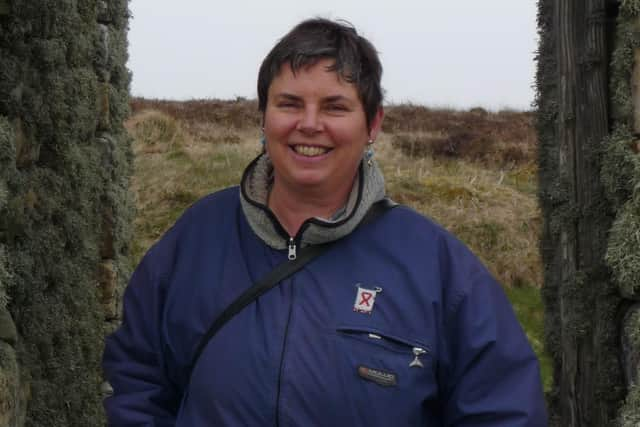Obituary: Caroline Wickham-Jones, archeologist who deepened understanding of prehistoric Scotland


Caroline Wickham-Jones was one of Scotland’s most active and engaged archaeologists, an expert on the Neolithic and the Mesolithic past of our country. It is largely due to her that the public is becoming aware of Scotland’s hunter-gatherers, who roamed our landscapes and waterways after the ice retreated, 9000 years ago.
Born in Middlesborough, in 1955, Caroline discovered the allure of the deep past in her youth and by the 1970s had convinced her parents to take her to Orkney for a first glimpse of the Neolithic sites which would remain a lifelong fascination. She took a degree in archaeology at Edinburgh University followed by a Masters in Heritage Management at Birmingham.
Advertisement
Hide AdAdvertisement
Hide AdAlthough active in teaching throughout her life, including a spell in South America, and a succession of honorary research posts at universities including York and Newcastle, she remained also a freelance archaeologist, directing excavations on Rum and Skye as well as Orkney.
On these sites her interest in Scotland’s Mesolithic deepened, and a book, Scotland’s First Settlers, appeared in 1994. Other publications, also intended for a broad audience, include Between the Wind and the Water (2006), The landscape of Scotland: A Hidden History (2009), Fear of Farming (2010), Orkney: A Historical Guide (2011) and The Monuments of Orkney: A Visitor’s Guide (2012). Clearly written, with expert command of the subject, these books speak to the value that Caroline placed upon wider communication.
In 2002 she was able to move with her son permanently to Orkney, to a house with views over the landscapes and seascapes so rich in prehistoric remains.
Her research and knowledge of the Neolithic helped create the Unesco Heart of Neolithic Orkney World Heritage Site. However, her interest in the Mesolithic continued, and because much of their traces lie now under the sea, in recent years Caroline developed techniques in underwater surveying. Almost her last publication, in 2018, was entitled Landscape Beneath the Waves: the Archaeological Investigation of Underwater Landscapes.
Her attitude to the past, said fellow archaeologist Mark Edmonds, was not as a refuge from present day travails, but rather as an aid to thinking about the present and the future. Inevitably, through watching rising sea-levels destroy many archaeological sites, she was an early advocate for environmental concerns.
Although a truly independent-minded expert, it is her generosity of spirit and her enthusiasm and willingness to communicate which is best recalled by fellow archaeologists, and her many friends. One colleague called her the least “territorial” of archaeologists.
She liked fun, and believed knowledge, like her food and home, was for sharing. Her own learning, across the full range of her interests, was available to all through her website, her personal correspondence, and in fireside conversation and field-walks.
On these latter, whether it be on an Orkney shoreline, a farmer’s field, or the headwaters of the Dee, her trained eye could spot tools and signs of the long-ago inhabitants. As recently as 2021, she was involved with a community project studying lithic scatter sites in central Deeside.
Advertisement
Hide AdAdvertisement
Hide AdCaroline had great reach, attracting the attention of artists and creative writers who came to her with research questions. Her correspondents had a habit of becoming friends.
There was no such thing as a silly question; an email with a query about hunter-gatherers or stone tools could be answered within hours, with links, learned papers, and photographs – and an invitation for tea.
When novelist Margaret Elphinstone was working on her novel The Gathering Night, set in Mesolithic times, Caroline Wickham Jones was consultant-in-chief. Margaret Elphinstone recalls: “It wasn’t long before I moved into her house for weeks at a time, with access to her amazing library, and a place on her dig at Long Howe.”
Her extensive website opens with a question: “Why Study Archaeology?” Her answer: “Because it will enrich your life. Whatever you do.”
The last entry on to her blog, written just weeks before her death, is characteristically generous. It is about diversity, and the lack of it in TV archaeology. "We live in a diverse world. Diversity existed in the past. Archaeology is a diverse profession. Surely we do not need to make much of an effort to reflect that in all we do?”
She insisted we should cherish the contributions of the “amateur”, and non-famous. “Those who work to unearth the smallest of archaeological sites make no less a contribution than those whose research will grace our television screens and newspapers.”
Our understanding of Scotland’s past and of each other in its present, was much enriched by Caroline Wickham Jones.
Obituaries
If you would like to submit an obituary (800-1000 words preferred, with jpeg image), or have a suggestion for a subject, contact [email protected]
A message from the Editor
Advertisement
Hide AdAdvertisement
Hide AdThank you for reading this article. We're more reliant on your support than ever as the shift in consumer habits brought about by coronavirus impacts our advertisers. If you haven't already, please consider supporting our trusted, fact-checked journalism by taking out a digital subscription. Click on this link for more details.
Comments
Want to join the conversation? Please or to comment on this article.
